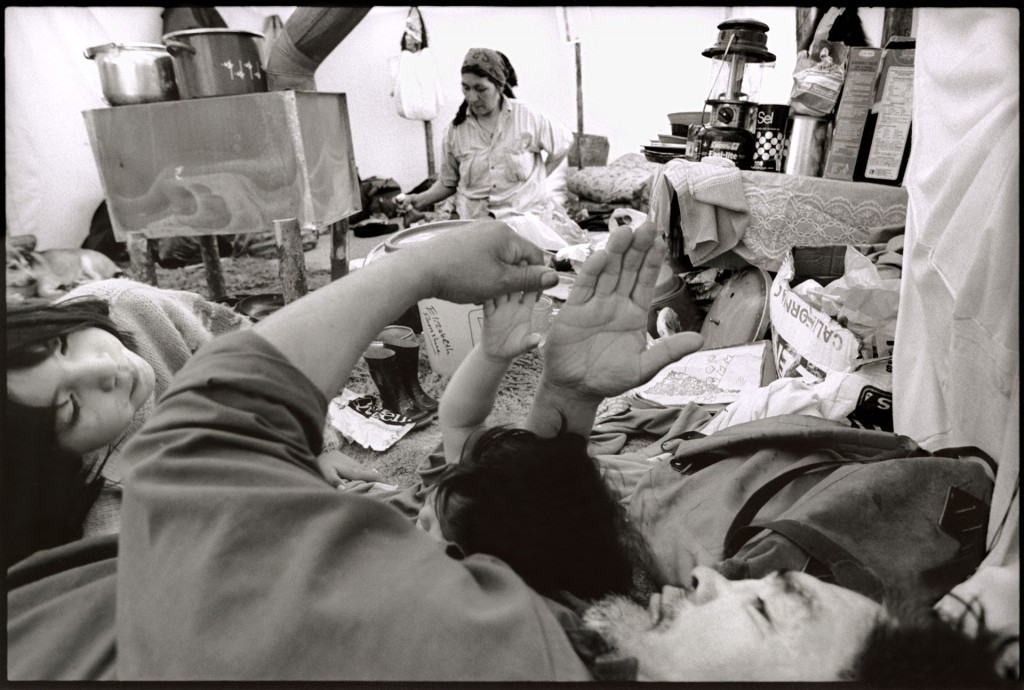Of Redemption: Remembering Francis Penashue

From RETURN TO NITASSINAN/HOMELAND.
Penashue Camp, Lake Minnipi, 1996. Francis Penashue lolls on the floor of his tent playing with his grandchildren while his wife Tshaukuesh (Elizabeth) Penashue prepares a meal of fresh duck and bannock on their home-made wood stove. The Penashues spend several months a year in the bush reclaiming their traditional Innu culture and passing it on to their children and grand-children.
It must have been about this time of the year, 24 years ago, when I met Francis Penashue, although I don’t actually remember our first encounter. I lived briefly with his family—in fact Francis’s father Matthew and partner and their grandson baby George Nuna—in the Mealy Mountains in the interior of Labrador, a place the Innu call Nitassinan, “Our Homeland”. I was intending to stay for only a few days, but became weather-bound for an additional week. It was 10 days that I can only regard as a privilege and that would tie me emotionally to that place and those people, affording me a perspective on the relationship between indigenous and non-indigenous peoples, and change my life.
Actually I don’t remember Francis in that 1989 camp per se but, I can still have nightmares about the Francis of that era, for he terrified me. Perhaps Francis was not in the camp at that time because he could not escape the poison that held him in its grip in the village. In those days, and for years before and some after, alcohol was his demon and he raged against it and the circumstances that drew him back to it again and again. No one was too young or too strong to escape his wrath, least of all his little kids or his wife, Tshaukuesh, and certainly no young white man with a camera and a big city attitude. I must have embodied everything he hated. For Francis was part of that lost generation of children wrenched from their families and beaten into submission in the residential schools, though in Francis’s case it was not technically a residential school, but the now notorious Mount Cashel orphanage on the island of Newfoundland. “Kill the Indian in the child” was Canada’s official policy in those years.
In the years that followed our first meeting, Francis beat back those demons into some form of recovery. I would stay again with his family in bush camps, but those times, he would be there, the dedicated father, adoring grandfather, sharing with family the traditional knowledge of how to live off the land, knowledge that he had acquired in his earliest years from his elders in the bush camps he was born and raised in. Francis’s sons became hunters and many of their children still know how to live off of and in harmony with the land. For that, Francis must have started to recover pride. Francis and Tshaukuesh’s tent became the heart of those bush encampments. By this time, the little children were no longer afraid of Francis, and there was a constant coming and going of little feet through the tent flap, both to savour Tshaukuesh’s partridge stew and to fill the balsam bow infused air with giggles.
In those latter years I knew him, we didn’t talk much, and he never spoke of the cruelty my kind must have inflicted on his child self, nor what of that he passed on to others. And after having my language forced upon him, why would he have wanted to use it to share such pain with me? Thereafter, Francis chose to speak mostly Innuemun as far as I know. That he rose above such deserved hate of my kind to condescend to sharing not only my company but the presence of my camera was huge for me personally. And so, like his children and grandchildren I learned by watching.
That was 1996, and I think Francis then was still struggling with remorse. I would like to think that—as later pictures and stories would indicate—Francis found some redemption in the role that he earned as elder and, along with Tshaukuesh, leaders of their people. It was a valiant thing he did—no mean feat of sobriety and wholeness in a social milieu then still highly compromised by multigenerational alcoholism. Many of his generation could not win that battle and succumbed to accidents, poisoning, suicide… indeed are succumbing still as are many their children and grandchildren. But Francis was evidence that the government, a succession of my governments—those groups of democratically elected Canadians who cynical legislation, with the blunt force of violence and with the careless failure to protect the people in its charge from mercury, carcinogens and other toxins into their food, water and air… Canadian governments that are still trying to deprive the First Peoples of their rights, autonomy and land—that they could not, cannot, “kill the Indian in the child”.
Earlier this morning CBC Radio journalist and producer Marie Wadden, who has written books about Francis Penashue’s journey, wrote of his final one, that it was Lou Gehrig’s disease that put an end to his life. Release from the tyranny of that disease is, I guess, some sort of blessing. Last evening Francis was removed from the hospital and brought out to spend his final minutes laying in the fragrance of spruce bows of a white canvas tent, cozy with wood fire—home—surrounded by a circle of 200 loving family and friends. To me, that is evidence enough of his redemption, and that redemption is possible, proof to all of us of the importance of sticking to our moral compasses, of keeping trying. One can only hope to have the strength and bravery to do such work, and when our times come, to be so lucky.
To Tshaukuesh, Peter, Max, Bart, Jack, Gervais, Robert, Freddie, Angela and Kanani, and your children and grandchildren, I am so sorry for your loss.
